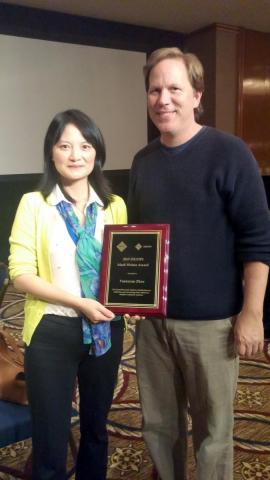Oct 13, 2015

San Diego, Calif., Oct. 13, 2015 — Computer scientist Yuanyuan “YY” Zhou from the University of California, San Diego, received the prestigious SIGOPS Mark Weiser Award during a ceremony Oct. 5. She was recognized “for innovative and creative contributions to detecting and recovering from defects in complex computer systems.”
"YY's research scales boundaries of systems and software engineering to produce solutions that strictly advance state of the art and find immediate use in practice," said Rajesh Gupta, chair of the Department of Computer Science and Engineering at UC San Diego. "In her quiet certitude, YY encodes the best among our researchers. We are proud of her accomplishments."
The Weiser Award, given by the ACM Special Interest Group on Operating Systems, goes to individual researchers in the first 20 years of their career, chosen based on contributions to computer systems research that are “highly creative, innovative, and possibly high-risk.”
“This award reflects YY’s innovative work on finding software defects at a large scale by using data-mining techniques,” said Stefan Savage, a computer science professor at the Jacobs School of Engineering, who was the first UC San Diego to win the award back in 2013. “These techniques have been commercialized and are now widely used at companies like Cisco, Qualcomm and Intel.”
Zhou also developed a system to automatically evolve fixes to software crashes as they occur. She employed virtualization, rollback and environmental mutation to do so. She is the second UC San Diego computer scientist to earn the accolade, putting the campus in the same league as MIT, Stanford and Google for the number of winners.
“As rapid advances in computing hardware have led to dramatic improvement in computer performance, the issues of reliability, availability, maintainability and cost of ownership are becoming increasingly important,” said Zhou, who is the first holder of the Qualcomm Endowed Chair in Mobile Computing at UC San Diego and an affiliate of the Qualcomm Insitute, which is the UC San Diego division of the California Institute for Telecommunications and Information Technology (Calit2). “My research aims to address these challenge issues in designing the next generation of computing systems.”
Zhou leads the Operating Systems Research Group at UC San Diego. Her work is focused on computer system reliability and availability. It also involves other disciplines, including architecture, databases, data mining and artificial intelligence.
Zhou is one of only a handful of faculty at UC San Diego who are both IEEE and ACM fellows. Her past honors include an Alfred Sloan Fellowship (in 2007), NSF Career Award (2004), CRA-W Anita Borg Early Career Award (2005), DOE Early Career Principal Investigator Award (2005) and IBM Faculty Awards (2004 and 2005).
Prior to UC San Diego, she was on the faculty at the University of Illinois at Urbana-Champaign from 2002 to 2009. She earned her Ph.D. from Princeton University in 2000.
Prior to UIUC, Zhou worked at NEC Labs and co-founded a storage startup, Emphora. In 2006, she also co-founded and remains CTO of Pattern Insight (which sold its Log Insight business to VMware in 2012), and more recently launched her third startup, Whova, which developed a mobile app for large events. The app has so far been used at more than 1000 events over 42 countries, including 36 TEDx conferences.
YY Zhou's website

